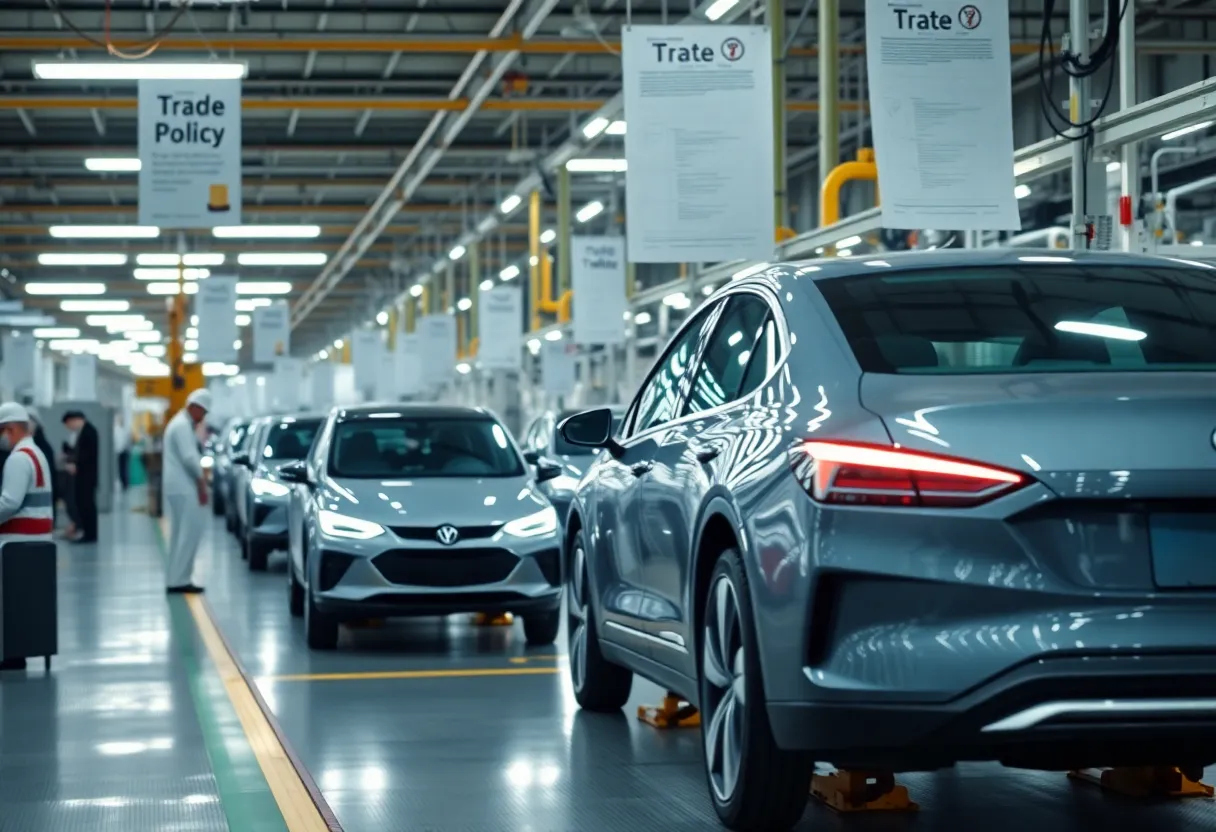News Summary
Executives from Rivian and Toyota emphasize the need for flexibility in the auto industry due to fluctuating trade policies and tariffs. Rivian continues to produce delivery vans for Amazon while dealing with the implications of U.S. tariffs. As tensions rise, both companies highlight the importance of internal communication and strategic adaptations to navigate these challenges and maintain competitiveness in the global market.
Detroit, Michigan – Executives from leading automakers Rivian and Toyota Motor North America have underscored the urgency for the auto industry to remain agile as fluctuating trade policies and uncertainties regarding tariffs continue to create challenges. This evolving landscape has prompted manufacturers to reassess their strategies to remain competitive and profitable in both domestic and global markets.
Amid these uncertainties, Chris Nevers from Rivian has emphasized the significance of having a clear “North Star” to guide operations while maintaining flexibility in response to unpredictable trade conditions. Similarly, Adam Farris of Toyota highlighted the necessity for improved internal communication and coordination to effectively adapt to any modifications in trade policies.
In light of recent tariff changes, both Rivian and Toyota have acknowledged the profound effects of U.S. tariffs on imported goods and the duties imposed on U.S.-manufactured products that are exported internationally. Demonstrating a commitment to their operations despite these challenges, Rivian is actively continuing production of delivery vans in the U.S. for Amazon, specifically catering to the European market, despite existing import duties.
The increased frequency of meetings between automakers and lawmakers has become a direct response to these rising tariffs, as companies aim to discuss potential implications on trade policies. Notably, Toyota has manufactured over 123,000 Tacoma trucks in Mexico, with a significant portion of these vehicles designated for export to the United States. The company is advocating for the preservation of the United States-Mexico-Canada Agreement (USMCA) to maintain a competitive edge in the global automotive landscape.
While adaptations to supply chain issues are crucial, Nevers noted that adjustments cannot be made overnight and may require months or longer. Experts assert that comprehensive supply chain analytics and customized corporate strategies are vital for navigating the fluctuating impacts of trade policies.
The impact of tariffs has already presented several challenges for auto-related businesses. SMT Automation, a Michigan-based machinery manufacturer, reported a staggering 40% drop in revenue linked to client delays in investments associated with tariff concerns. This decline compelled SMT to reduce staff and hindered planned expansions.
Many automotive companies have significantly curtailed capital spending as uncertainty looms regarding tariff implications. General Motors reported a notable 33% decrease in capital expenditures in early 2023, attributing this dip to the uncertainty surrounding tariffs affecting profitability projections. Some companies, such as Marelli Holdings, have even filed for bankruptcy, citing the detrimental impact of tariffs on their profit margins.
President Trump’s fluctuating tariff policies have complicated planning efforts for parts suppliers in the automobile sector, resulting in reported job losses, particularly in Michigan, where recent layoff numbers have spiked. Additionally, the tightening availability of capital financing has led banks to restrict credit lines as revenues continue to decline. Smaller suppliers, faced with these adverse conditions, are now seeking alternative financing solutions to sustain their operations.
To mitigate the financial strain caused by tariffs, a group of Michigan-based suppliers is actively pursuing foreign trade zone status, which could potentially lessen tariff impacts on their cash flow. Meanwhile, larger automotive firms have exhibited cautious investment behaviors as they await clearer directives on tariff regulations.
As of now, many automakers have reported that a number of new vehicle programs and investment initiatives are either on hold or facing delays, reflecting the broader uncertainty affecting the industry. The combined effects of changing trade policies and tariff uncertainties present ongoing hurdles that many in the automotive sector must navigate.
Deeper Dive: News & Info About This Topic
HERE Resources
General Motors Invests $4 Billion in U.S. Manufacturing
HR Acuity Celebrates Six Consecutive Years as a Great Place to Work
HR Acuity Earns Great Place To Work® Certification for Sixth Year
GM Invests $4 Billion to Bring Production Back to the U.S.
GM Invests $4 Billion to Boost U.S. Manufacturing
GM Announces $4 Billion Investment in U.S. Manufacturing
Automotive Industry Faces Uncertainty Amid Trade Tariff Policies
BYD Launches Dolphin Surf EV in Europe
Chinese Manufacturers Eye UK Electric Vehicle Market
LACROIX Electronics Shuts Down Grand Rapids Facility, Over 100 Jobs Lost
Additional Resources
- LiveMint
- Wikipedia: Tariffs in the United States
- USA Today
- Google Search: auto tariffs impact
- Reuters
- Google Scholar: automotive industry tariffs
- Detroit News
- Encyclopedia Britannica: Tariff
- The Guardian
- Google News: Michigan tariff jobs
Author: STAFF HERE NOVI WRITER
The NOVI STAFF WRITER represents the experienced team at HERENovi.com, your go-to source for actionable local news and information in Novi, Oakland County, and beyond. Specializing in "news you can use," we cover essential topics like product reviews for personal and business needs, local business directories, politics, real estate trends, neighborhood insights, and state news affecting the area—with deep expertise drawn from years of dedicated reporting and strong community input, including local press releases and business updates. We deliver top reporting on high-value events such as Motor City Comic Con, Michigan State Fair, and Novi Home and Garden Show. Our coverage extends to key organizations like the Novi Chamber of Commerce and Novi Community Foundation, plus leading businesses in automotive, technology, and manufacturing that power the local economy such as Gentherm, Stoneridge, and Daifuku North America. As part of the broader HERE network, including HEREDetroitMI.com, HEREGrandRapids.com, HERENorthville.com, and HEREPlymouth.com, we provide comprehensive, credible insights into Michigan's dynamic landscape.






